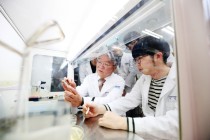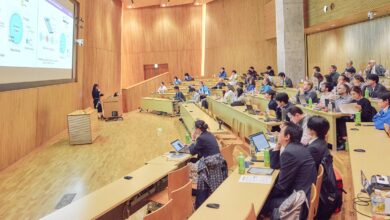Microbes as a Solution to Combat Climate Change: Harnessing Nature’s Power

Recent research conducted at the Korea Advanced Institute of Science and Technology (KAIST) examines the role of microbes in combating climate change, particularly in reducing reliance on fossil fuels and converting carbon dioxide (CO₂) into valuable chemical products.
Impact of Fossil Fuels on Climate Change
Fossil fuels are known contributors to climate change, primarily due to CO₂ emissions released during combustion. Research efforts are focused on diminishing dependence on these energy sources and finding ways to convert CO₂ back into useful hydrocarbons.
Transitioning to Renewable Biomass
Sang Yup Lee, a professor in KAIST’s Department of Chemical and Biomolecular Engineering, highlights the necessity of transitioning from fossil fuels to renewable biomass, specifically targeting non-edible waste materials generated by agriculture and food processing. This shift could facilitate the production of sustainable fuels and chemicals.
Systems Metabolic Engineering
The KAIST team is advancing research in systems metabolic engineering (SME), which combines traditional metabolic engineering with systems biology, synthetic biology, and evolutionary engineering. This innovative approach has led to successful initiatives, including the electrolytic conversion of CO₂ in conjunction with microbial fermentation. The bacterium *Cupriavidus necator* has been employed to produce biodegradable polymers such as poly-3-hydroxybutyrate.
Research on Acetogenic Bacteria
Another significant research focus involves the bacterium *Eubacterium limosum*, which can convert carbon monoxide (CO) and CO₂ into acetate. Enhancing the growth rates of this bacterium requires increasing its tolerance to carbon monoxide.
Long-term Cultivation and Genetic Advancements
Under the direction of Byung-Kwan Cho from KAIST’s Department of Biological Sciences, researchers have cultivated *E. limosum* for nearly 400 generations in environments with progressively higher CO concentrations. This long-term cultivation resulted in a strain exhibiting improved CO tolerance, identified through whole genome resequencing.
Innovative Chemical Production Pathways
Leveraging these advancements, the research team has introduced a synthetic biosynthesis pathway to facilitate the production of 2,3-butanediol in the newly adapted bacterial strain. This development opens avenues for inducing similar mutations in other acetogenic bacteria, potentially leading to the creation of pathways for diverse chemical productions.
Future Prospects and Challenges
Cho notes the promise of converting hazardous waste gases into chemicals typically sourced from petroleum, utilizing artificial pathways that yield predictable results.
Scaling Industrial Applications
Moving forward, the primary challenge lies in scaling laboratory results to industrial capabilities. Lee points out that issues such as gas transfer mixing and heat exchange are common in scaling processes across various production systems.
Urgency of Sustainable Solutions
Lee asserts the urgent necessity of phasing out fossil resource dependence and establishing sustainable systems to ensure a viable future.
Original source: Nature.




